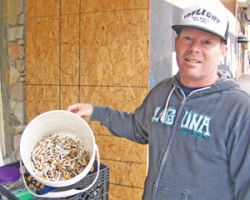

John Griffith says he is not anti-smoking.
“I’m for not polluting the ocean,” said Griffith, 44, of Seal Beach as he proudly shows off a collection of cigarette butts in a plastic pail. He collected the butts from canisters he helped put up on light poles along the city’s Main Street. The project is part of the local Surfrider Foundation’s national “Hold On To Your Butts” campaign. It provides the canisters for cigarette smokers to dispose of their cigarette butts, which can pile up along sidewalks, curbs and gutters. From there it can be a short trip to the storm drain and then to the ocean and sometimes, back onto public beaches.
According to Griffith, cigarette butts do not biodegrade because they are roughly 95 percent cellulose acetate (a form of plastic) and are the single most discarded pieces of litter in the world. The lifelong surfer originally from the Bay Area becomes animated when talking passionately about the ocean environment.
“Seeing cigarette butts on the ground really gets under my skin,” he said. “I want the city to understand the importance of this.”
Griffith said Seal Beach is the only city he knows that has the Surfrider canisters that won’t pay their city employees to clean them out. Therefore, he said, he does it.
Meanwhile, the city of Seal Beach is planning to replace many of the current light poles on Main Street when it completes its steet lighting improvement project. When it does, it is uncertain whether or not they will allow the canisters to be put on the new poles.
“We don’t know the answer to that yet,” said Seal Beach’s Assistant City Manager Sean Crumby. “We are going to assess that when the new lights are up.”
However, Crumby said that: “Any method we can use to reduce cigarette butts going into the ocean is a good thing.”
Griffith said he has experienced mixed reactions to his quest to keep cigarette butts from being discarded on the street.
“I asked one guy to use the canister and he said, ‘Thank you, I did not realize I have been throwing my cigarette butts on the ground for 35 years’,” Griffith said. “That’s a lot of cigarette butts on the ground from one person when you add them up. If it’s two packs a day, how many cigarettes per day, 365 days a year?”
Griffith said one time in Northern California he suggested another person not throw their cigarette butt on the ground and they took offense.
“He told me to mind my own business and tried to hit me,” Griffith said. “I’m lucky ther was a cop nearby so he stopped.”
Griffith said that he personally finds cigarette butts on the ground “disgusting.”
They bring to mind sad memories for him.
“My mother died of smoking,” he said. “Seeing her on her death bed from it made a powerful impression on me.”
However, Griffith said he understands if someone wants to smoke it’s their own business. He would just rather see their cigarette butts collected in the Surfrider program, which he says actually collects the butts and then recycles them.
In another aspect of the “Hold On To Your Butt” program, Surfrider Foundation volunteers have handed out personal “pocket ashtrays” as “gifts from Surfrider to help us keep our beaches clean.”
Griffith said he is hoping to work with the city so the program continues in Seal Beach.
For more information about the Surfrider Foundation’s “Hold On To Your Butt” program, see the website www.hsbsurfrider.org.



